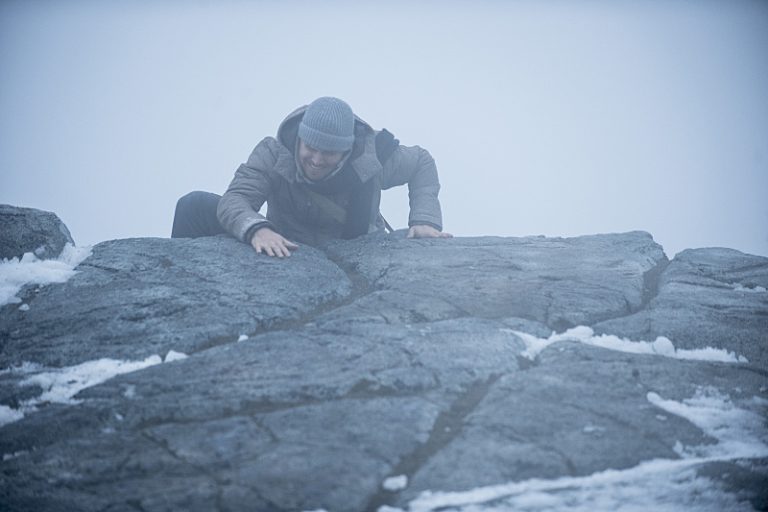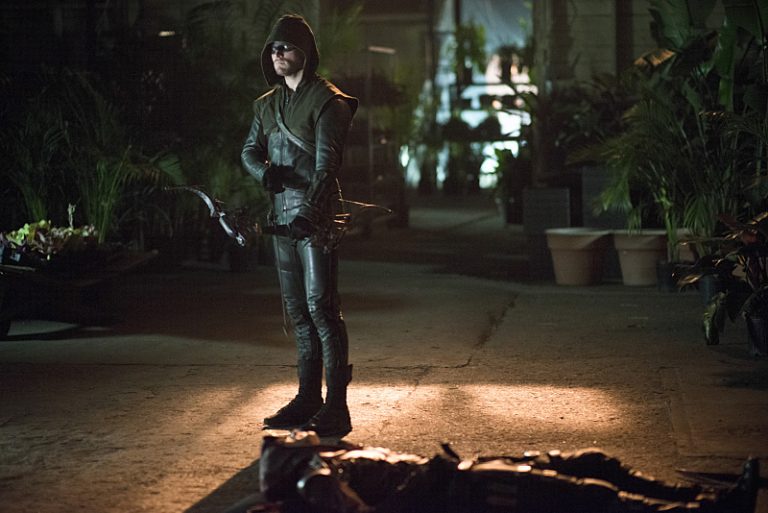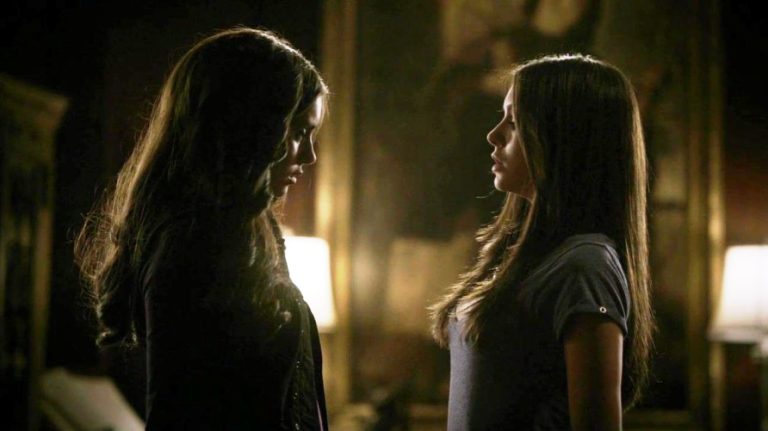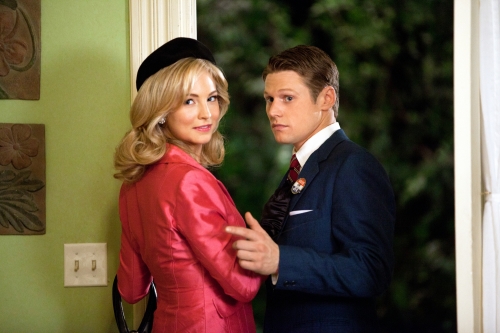
You may have noticed, there’s a glaring absence in my review roster for Arrow season two. Yes, the season finale! There are a few reasons for this, one being that I got a little too snowed under by all the Upfronts excitement and the season finales of other CW shows, like my primary show, Supernatural. However, there’s another reason why this review is delayed. As much as I loved the finale (and I did in every way), I felt it was more important to take some extra time to examine the season long journey of Oliver Queen and company, what led them to this point, and where they can possibly go from here. After all, the finale did that great a job of tying things together while setting up many great new possibilities.
Season Two in a Nutshell
No doubt about it, Arrow season two was a drastic improvement over Arrow season one. The characters and premise had been well established by this point and it was time to follow a hero’s journey. It was no longer about taking care of bad guys “on the list.” It was bigger than that. Oliver truly needed to save his city and himself in the process.
Season two kickstarted with Oliver Queen; broken vigilante. His best friend Tommy had died (still grieving!) and he decided wallowing on the island, the very place of horror he spent years trying to escape, was a great place to go have a personal retreat. Luckily Felicity and Giggle had this thing called a plane and Ollie had to face reality.

Oliver Queen once again found himself the reluctant hero, picking up the bow and arrows out of necessity but with a new philosophy. He couldn’t be a vengeful killer. He had to drop the vigilante act, because that man wasn’t a person Tommy could accept. We know it prevented Oliver from liking what he saw in the mirror. Even vigilantes should be held to a moral standard and killing, no matter if the scumbag deserves it or not, is wrong. Doing otherwise would be an atrocity to Tommy’s memory. While that sounded like a great plan on paper, was it realistic? That dilemma gave season two some great material and constantly put Team Arrow to the test.
Oliver through the course of the season learned that in order to take the journey that honored Tommy, he would have to accept a role he never wanted, Hero. The hero’s journey is never an easy one, and to accept that role means many challenges, ones that Oliver never anticipated. It came with many costs too, ones that drastically changed the green hooded one. By episode 2.07 it was well established that in some cases, killing the villain was the only choice. Oliver as The Arrow had to kill The Count to save Felicity’s life. It was a choice that haunted Ollie, but tough choices exist in this business, and Oliver managed to build a pretty good track record despite that one kill. Plus I have this feeling that Tommy was sitting in the great beyond giving his best pal a pass on that one.
Oliver often showed his human side during his adventures, another real mark of a hero in the making. He spared Helena, aka The Huntress, who had returned when another opportunity came up to kill her father. Oliver even took time to sympathize and offer help after she was captured and left devastated when someone other than herself killed her father, and that was after Helena almost killed those close to him. He was also able to reconnect with his good friend Alexi Leonov in Russia, and we even got to see in the flashbacks how he was saved by Oliver and Sara and worked with them on the island to get Ivo and Slade. Oliver also made the commitment to save Roy, bringing him into the fold and trying to be a mentor, rather than deciding he had to die or let him take the wrong path alone. Thea’s protection was often the motive, but we know he really likes Roy too.

The Arrow’s actions began to earn respect, none more than earning the good graces of Quentin Lance. He dropped calling him “the vigilante” and began calling him “The Arrow.” Sure a part of him had to know The Arrow was really Oliver, especially when he learned Sara was The Black Canary, but he didn’t want to really know for sure. He needed that illusion, to believe in the idea of the hero, not the man. Once Quentin and others started believing in the idea, not the man, Oliver had to adopt that way of thinking as well.
Oliver did less well with his own family and his responsibilities for Queen Consolidated. Being The Arrow meant many conflicts of interest and Felicity and Diggle covering for his absences didn’t work out too well. It left the company vulnerable to be taken over by Isabel Rochev, a former mistress of Robert Queen’s who was bent on revenge, who tricked Oliver in a moment of confusion and blind faith to sign over the company to her. He also wouldn’t open up about his time with Slade on the island which ended up putting his family in danger. He didn’t tell Thea about Malcolm being her father when he found out, instead deciding to be frosty toward Moira for keeping that secret (yeah, but didn’t she deserve it?)

If Oliver kept up one thing though he inspired loyalty. The core members of Team Arrow held true, keeping up everything that had to be done, despite everything thrown their way. This season especially gave Felicity many moments to shine. For one, she found Oliver Queen was not the easiest guy to work for. A lot of times Oliver cursed her out for coming up short, but that only motivated her to try harder. It helped that Diggle was there for moral support, but no matter how low Oliver got, both mentally and physically, no matter who chose to abandon or leave him behind, Felicity and Diggle always stood behind their boss. They fully signed on for the mission and weren’t going to let anything change that.
While Felicity’s plot and growth was great overall, the show did tend to push her stories sometimes into ridiculous soap opera territory, like when Sara came along to take away some of the attention she was getting from Oliver and when he decided to sleep with Isabel for fun. The jealousy and envious behavior proved to be a big time waster and seemed like it was there to appease “Olicity” shippers. Another time waster was her falling all over Barry Allen, even if those two were truly adorkable together for the episode “The Scientist.” Sure, that gave her a connection to Star Labs that ended up saving the city in the final two episodes, but overall it made her seem more flighty and insecure by showing Oliver that she had someone else to adore. Felicity is a much smarter character than the childish insecurities they put her through and I hope that they can work past that in season three and never look back.
Speaking of forcing drama, the season continued to have it’s weak spots those with secondary characters, none more glaring than the saga of Laurel Lance. The writers again failed to make her a sympathetic character, so her spiral into drug addiction generated more “Please, get on with it,” outcries and any real concern for Laurel. Who could enjoy any minute of her having a hissyfit over finding out her long presumed dead sister was alive and those awkward Lance family dinners? Any screen time taken by Laurel was very painful and a chore to watch, not to mention taking away from the very busy DC landscape that was being utilized. I accept that hers is also a hero’s journey, but it’s not as a compelling one.

Another weak spot was Thea and Moira, although you have to give the show credit for dealing with the latter in the ideal dramatic way. It was obvious as Moira went through her prison drama in the early part of the season that her character was there to provide more filler than substance, adding little to the family dynamics. She too was unlikeable and her actions often questionable. As viewers we had to ask, what could Moira possibly do if she was acquitted or sentenced? The answer was, nothing much. There was more filler with her running for mayor, something inexplicable given her role in The Undertaking, but there she was as a contender until the moment she was brutally struck down by Slade Wilson to the horror of Thea and Oliver. It was the perfect sendoff for a manipulative, all over the map character, one that hardly was an inspiration to anyone. She sacrificed herself for her children, and that’s exactly the way she should have gone. She went leaving another big secret though about a child Oliver fathered (she paid off the mother to leave), one that’s surely going to bite Oliver sooner than later.
Expanding the DC Universe
Season two really expanded Oliver’s world by opening up the DC Universe, introducing several familiar names to excite the die hard fanboy (not to mention appease TPTB at DC). Most of the villains could be easily traced to the comics; Shrapnel, Bronze Tiger, The Clock King, The Dollmaker, and the return of The Count, The Huntress, The Triad, and Amanda Waller with A.R.G.U.S. The last one represented the most intriguing expansion because we got to see for the first time in action The Suicide Squad, featuring Diggle’s ex-wife Lyla and frenemy, Dead Shot. The new romance and bond with Dead Shot bolstered an otherwise non existent plot for Diggle and a new universe in which he could expand.
The most recognizable DC character name to the Green Arrow’s world though is the Black Canary. She was notoriously tied to Oliver in the comics both professionally and personally, so to not offend continuity she had to be tied to the Lance family. The reveal that Sara Lance was the heroine was not much of a surprise, but that did nicely open the door for bringing into the mix the League of Assassins, since we find out that Sara was part of that organization. It certainly gave Arrow several more elaborate Ninja style fight scenes with bows and arrows thrown in for fun. Nyssa al Ghul, the daughter of Ra’s al Ghul, showed up as the heir apparent to the League, and is Sara’s lover as well. Yes, turns out Sara swings both ways. That made Sara’s ties more personal, and therefore impossible for her to truly leave the league no matter how hard she tried.
It’s a DC mad scientist though, Anthony Ivo, that was the catalyst for the season long arc. In the flashbacks, it turns out Sara was rescued after she floated out to sea and was brought into the world of Ivo, who was testing out a new formula on a ship full of prisoners. Eventually Oliver was captured and brought to the same ship. Enter the mirakuru, or “miracle” in English. It turns people into super human soldiers that are almost impossible to kill, that is assuming the test subject survives the process. Most didn’t, but Slade Wilson did, when Oliver injected him with it while he was dying on the island.

Thanks to this new arc, we got to see the evolution of Slade Wilson into Oliver’s sworn enemy and super villain, Deathstroke. The unfolding and eventual tying together through the flashbacks of what happened then with abductions and deaths currently happening in Starling City was a real jewel in the show’s mythology this season. It was gradual, often made us wonder where they were going with this and when it all came together, the payoff was grand. We wondered who the villain in the skull mask was, testing the new version of the mirakuru on vagrants in The Glades, and it was none other than the current alderman and candidate for mayor, Sebastian Blood. He was recruited by another though, one that was truly pulling the strings and promised to make Blood mayor. One who convinced him he wanted the same changes in Starling City. Yet the flashbacks showed that Ivo’s formula was destroyed. Who could possibly bring it back and why Starling City? Yes, that was a rather thrilling reveal to see that an older, more grey Slade Wilson was in town and behind it all.
The mirakuru makes senses sharp, a villain rather smart, and completely delusional. Slade saw things, like the ghost of Shado instructing him on how to get his revenge. The flashbacks played out the terrible catch 22 that Oliver was forced to make that shaped everything that happened this season. He had to choose by Ivo’s hand who would die, Shado or Sarah. Oliver chose himself and wouldn’t decide, so Ivo shot Shado. Since Slade was in love with Shado, even though she was with Oliver, that was enough to convince Slade in his demented state that Oliver killed Shado and he had to suffer for it. Not just die, suffer. His true chilling plan played out in the finale, and it was more diabolical than anyone imagined.
Sure, it seemed a little over the top that Slade would cling to this one twist of fate as a way to ruin Oliver’s life in ways unimaginable, including killing scores of innocent citizens in Starling City, but that over the top behavior of the villain is a comic book element that must play out in live action for the adaptation to be true. What’s great about this story though is it’s not all dark. In the comics, unlikely heroes emerge, and in the battle of Starling City that was the case here.
The mirakuru was also the plot device that brought Roy into the superhero fold as well. Roy was kidnapped, injected, and survived, although he suffered many of the same early side effects as Wilson. Oliver’s hope to help Roy channel is anger and power constructively was his chance to make up where he had failed with Slade, thus adding the desire for redemption to his goals for this season. Sadly Roy wouldn’t listen to The Arrow, so Oliver had to share his true identity and use Thea as his calming point. When Sara and Roy were added, the Arrow cave suddenly looked pretty crowded. It became a bit of a running joke by the end of the season, who didn’t know Oliver was The Arrow? Even Moira confessed she knew, just before she was killed. Seems it’s a dangerous secret to have.

I liked that Sebastian Blood this year was the villain turned hero, realizing that Slade’s true plan was to destroy the city and everyone in it to punish Oliver. He casually walked away with the cure that Slade’s men had captured, handed it over to Oliver and then suffered the ultimate consequences of death via Isabel Rochev. I know Blood was pretty much marked for death, but I wish he could have stuck around and be mayor. Starling City needs some hope, and it would have been cool to have a Arrow phone or something in his office. At least he went out with redemption and ultimately did save his city, even if he also played a role in it’s doom.
“Unthinkable” and Season Three

For a vigilante turned hero that swore that there would be no killing of enemies, there was a ton of action and death. But it was awesome action and death! It all picked up where the previous episode left off without skipping a beat. The Battle of Starling City felt epic and there was no cutting back on the production. It looks like they decided to blow the whole budget on this episode. The finale proved though that even Oliver can’t control the actions of others. By accepting the help of the League of Assassins that meant blood would be spilt, and they weren’t exactly going to renege on their “take no prisoners” policy. However, someone had to die, and I’m okay with Nyssa taking out Isabel Rochev. She had to go. This does of course raise the question who controls Queen Consolidated if she’s dead, so I assume there will be some other corporate pushing bad guy to emerge in season three.
Oliver was often tested through the season, each test just as powerful as the previous, but remarkably he stayed true to his promises. He especially faced challenges when Sara didn’t share his same commitment to not killing the absolute worst villains including Slade Wilson. The cure changed all that though, and he was able to right a wrong he made when deciding to kill Slade instead of curing him five years ago on that freighter. The Battle of Starling City was won because Oliver believed in his team and let them play their part. He’s accepted he can’t go it alone which is another mark of a hero. I was impressed with him choosing to arm Felicity with the cure, having her plunge it into Slade’s neck when he set her up as bait with the “you’re the woman I love” talk. (Yes, I know that little twist teased the Olicity fans, but wasn’t it really cool too?) She took it like a pro and it was a major step for her too in becoming a fighting member of the team.

In the comics there are two Black Canaries, a mother and eventually her daughter. It’s obvious from Laurel’s path this season that she is being primed to take over the role from her sister, especially now that Sara has gone back to Nyssa and the League of Assassins. Thanks to Slade Wilson Laurel learned Oliver’s secret and worked her way in the increasingly crowded Arrow cave as Oliver’s confidant. The question is, will we want to see her put on the suit and fight with Oliver side by side like Sara did most of this season?
My favorite and slickest part of the entire hour was the back and forth montage between Oliver fighting Slade in present day and back on the Amazo freighter in the past. It heightened the intensity of the showdown and served as a reminder how long the history and bad feels go between those two. One of them must be defeated and since the show is called “Arrow,” we pretty much knew who that was going to be. Oh, but it was a very satisfying defeat, because Oliver triumphed in the best way imaginable. He succeeded at capturing his foe without killing. He saved his city and accepted the role of hero and savior. His mission is now true, and he’s ready to fight for his family’s company back too. If he gets it back though, will he be able to bridge being superhero vs. CEO? Last I looked that wasn’t working so well.
I wondered why Amanda Waller and A.R.G.U.S. were ready to blow up Starling City, until I saw that it was a great setup for season three. Seems that Oliver’s history goes deep with this organization, and we’re about to find out about it in season three flashbacks. Use of Suicide Squad by Diggle and Lyla to stop Waller from destroying Starling City felt like they were throwing the kitchen sink at us, but it worked.

Thea’s saga, which was better but still often pointless this season, finally took a turn when she chose in the finale to go with her father, Malcolm Merlyn, rather than stay in Starling City and pursue a relationship with Roy. When a failed but gutsy assassination attempt on dear ole dad impresses the old man, you know this is not going to be an ordinary pairing. This finally gives her the chance at a meaty storyline that she deserves, and the absence of Moira chewing up scenery gives her that space. Adding John Barrowman to the cast only adds huge promise.
Speaking of Roy, now that he’s cured from the mirakuru, will he choose to be the simple sidekick and protege to the Arrow? How will he handle the loss of Thea? There’s a big risk that Roy’s story could go stale without turmoil in his integration, but at the same time how much of it will be a repeat of what we had this season? I’m curious to see what the writers have planned for him.
Since we’re on the subject of season three, DO NOT KILL DETECTIVE LANCE!!! This show needs a responsible older adult. They already offed Moira, Quentin can’t go too. He finally got his vindication. I accept it’s a cliffhanger, but please let this be a device to serve another purpose to push Laurel toward being the Black Canary and us not mourning another fallen hero.
Also for season three, try to avoid the contrived Oliver, Felicity and Laurel love triangle. Both Felicity and Laurel has plenty of room left to grow, and wasting time that could be happening on soapy drama already weakens what is a very sharp story.
Well done to everyone involved with Arrow. Thanks for the very exciting season. I’m already eager for season three and ready for more intense action and character growth. It’s going to be a long wait until October.
What did you think of the path taken by Arrow this season? What are your hopes for Oliver and Team Arrow in season three?




